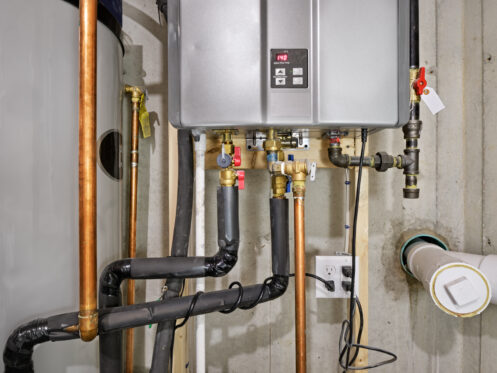Water heaters play a significant role in the lives of their users, providing hot water for showering, laundry, washing dishes, and undertaking numerous household activities. Tank water heaters, which hold large amounts of hot water in a reservoir for instant use, have historically dominated the market. On the other hand, tankless water heaters have become a more popular and space-saving option in recent years. These cutting-edge devices have many advantages over their traditional counterparts, one being heating water on demand.
Here we will examine the advantages of tankless water heaters, exploring their cost-effectiveness, environmental impact, energy efficiency, and space-saving design.
Energy Efficiency
One of the most outstanding benefits of tankless water heaters is their unmatched energy efficiency. Conventional tank water heaters need a steady supply of energy to maintain the proper temperature because they continuously heat a large volume of water in a reservoir. Tankless water heaters, on the other hand, only heat water as needed. This essential distinction results in a significant decrease in energy usage.
The U.S. Department of Energy estimates that water heaters without tanks can save up to 24–34% more energy than tank water heaters. The lack of standby heat loss is the cause of this efficiency. Tank water heaters require the heater to constantly reheat the water because heat escapes from the stored water into the surrounding area.
Because tankless models only heat water when a faucet is turned on, they prevent this heat loss and are, therefore, an excellent option for consumers who care about the environment and want to lower their energy costs.
Unlimited Hot Water
Water heaters without tanks provide a never-ending supply of hot water. In the event that the storage tank in a conventional tank heater runs empty, you risk running out of hot water. Conversely, tankless models guarantee a constant supply of hot water by delivering it on demand. This feature is especially helpful in homes with lots of occupants and a high level of hot water consumption.
Durability
Tankless water heaters have a reputation for being durable. Since there isn’t a tank, there aren’t any rust or corrosion problems, which are a frequent occurrence with tank heaters. Because of their longer lifespan, they do not require frequent replacement, thus having a lower environmental impact on manufacture and disposal.
Compact Design
Compared to conventional tank heaters, water heaters without tanks have a substantially smaller footprint. They can be mounted on walls or in tight areas, allowing you to save space in your home. If you are working with limited space, such as apartment renters or homeowners trying to maximize their storage options, this compact design will come in handy.
Temperature Control
With the accurate temperature control offered by tankless water heaters, you can adjust the water’s temperature to suit your needs. A pleasant and reliable hot water supply is guaranteed with this level of control, whether it is being used for dishwashing, bathing, or other purposes.
Minimal Water Waste
Tankless water heaters are particularly helpful in cutting down on wasted water. Before hot water flows from the faucet in a tank water heater, cold water that has been sitting in the pipes needs to be drained. On the other hand, tankless models minimize the need for flushing out cold water because they only heat water when needed.
Decreased Maintenance
Compared to tank water heaters, tankless water heaters require less maintenance. This is due to the absence of a tank that can collect sediment and minerals, which shortens the lifespan and efficiency of conventional water heaters. As tankless water heaters require less maintenance, this translates into lower maintenance costs.
Reduced Energy Bills
Typically, a tankless water heater has a higher initial cost than a tank water heater. However, many homeowners prefer this choice as it represents a cost-effective option in the long run. As mentioned earlier, water heaters without tanks use less energy, leading to a decrease in energy costs. These savings have the potential to compensate for the unit’s original cost eventually.
Extended Lifespan
In comparison to tank models, water heaters without tanks have a longer lifespan. A tankless heater can last up to 20 years, whereas a tank heater may need to be replaced every 10 to 15 years. Due to the longer lifespan, fewer replacements will be needed over time, allowing you to save the money that would have been used for new equipment and installation.
Government Incentives
There are governments and utility companies that provide rebates and incentives for the installation of energy-efficient appliances such as water heaters without tanks. These incentives can reduce the initial cost of purchase, increasing their cost-effectiveness.
Property Value
Installing a tankless water heater can raise your home’s potential selling price. They can increase the appeal of your property and increase its sale price because prospective buyers frequently see them as a contemporary and environmentally friendly feature.
Minimized Carbon Footprint
Water heaters without tanks are a more environmentally friendly option that benefits the world at a time when environmental sustainability is becoming more and more important. Greenhouse gas emissions are reduced due to the energy efficiency of tankless water heaters. These units help mitigate climate change and leave a smaller carbon footprint by heating water with less energy.
Decreased Manufacturing Impact
Compared to tank models, water heaters without tanks last longer. The environmental impact of producing and disposing of water heaters is decreased because of their longer lifespan, which requires the manufacture of fewer units.
The benefits of installing tankless water heaters may seem overwhelming at first, but the advantages outweigh them in the long run. Water heaters without tanks offer a great way to create a more economical, eco-friendly, and efficient home at a time when environmental sustainability and energy conservation are important concerns.
Factors to Consider When Choosing a Tankless Water Heater
It is important to be aware of these aspects when determining the best tankless heater for your home.
Gas vs. Electric
There are gas and electric versions of water heaters without tanks available. Larger homes with high hot water demands are better suited for gas models as they have a higher flow rate. For smaller households, electric models are more suitable.
Sizing
It is crucial to select a heater with an appropriate size based on your requirements. Depending on the desired flow rate and rise in temperature, you can ask a professional to help you select the best device size for your home.
Call the Professionals
At Bumble Breeze, we take pride in being the leading HVAC company in Las Vegas and surrounding areas. Our services range from installation, repair, maintenance, and replacement of your heating and air conditioning systems to catering to your plumbing needs.
For plumbing, we offer services such as repairs on sewers, drains, pipes, septic tanks, toilets, and faucets, as well as work on new construction, sprinkler systems, and sump pumps, among others. Contact us today, and let us work together to create a comfortable home for you and your family.


